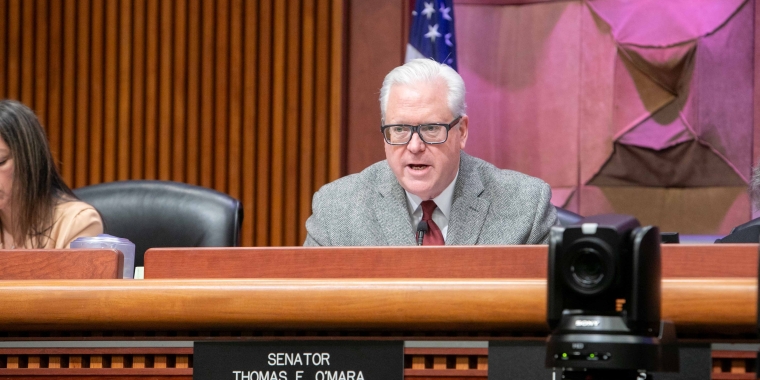
Senate sets stage for final state budget talks, calls for immediate takeover of growth in local Medicaid costs
Thomas F. O'Mara
March 12, 2012
-
ISSUE:
- Budget

Albany, N.Y., March 12—State Senator Tom O’Mara (R-C, Big Flats) said today that the Senate has approved a proposed state budget that accelerates Governor Andrew Cuomo’s call for the state to take over future growth in local Medicaid costs.
The enactment of the Senate’s formal 2012-2013 Budget Resolution spells out proposed changes to Governor Andrew Cuomo’s 2012-2013 Executive Budget proposal and sets the stage for final negotiations with the governor and the Assembly on a new state budget.
“This new budget needs to begin a true turnaround in the state-local partnership and immediate relief for local property taxpayers,” said O’Mara. “The Senate budget takes immediate steps toward getting counties and property taxpayers out from under the burden of Medicaid, the single-largest unfunded state mandate.”
In the $132.5-billion budget proposal he unveiled in January, Cuomo called for a three-year state takeover of future local Medicaid growth increases, beginning next year.
O’Mara has said that while the governor’s plan moves in the right direction, it doesn’t move fast enough. The Senate budget, on the other hand, calls for the takeover of local costs to begin this year and would result in a full state takeover of local Medicaid cost increases by 2014.
Under the Senate budget, area counties would receive the following projected Medicaid cost savings this year: Chemung ($187,147); Schuyler ($34,864); Steuben ($181,094); Tompkins ($110,925); and Yates ($39,609).
Projected five-year savings under the Senate plan are: Chemung ($6,051,777); Schuyler ($1,127,406); Steuben ($5,856,051); Tompkins ($3,586,989); and Yates (1,280,835).
Overall the Senate plan would save counties $1.2 billion in Medicaid costs over the next five years.
The proposal mirrors legislation O’Mara introduced last year (S.5787) with local Assemblymen Phil Palmesano (R-C-I, Corning) and Chris Friend (R-Big Flats) that calls for an immediate, full freeze on local Medicaid cost increases. The area lawmakers have also joined a bipartisan coalition of more than 80 state legislators pushing for legislation (S.5889) to begin an eight-year phase-in of a complete state takeover of all local Medicaid costs.
O’Mara and other state legislators have argued that it’s unrealistic for the state to keep requiring local governments to find a way to handle Medicaid growth – and other unfunded state mandates -- in the face of the 2-percent property tax cap the state imposed as part of last year’s state budget.
O’Mara highlighted Medicaid relief and a comprehensive new jobs program called “New Jobs-NY” as the cornerstones of the Senate budget.
“It’s time to do anything and everything possible to remove New York from the list of states with the worst business climates in America. Government can help lead that effort by cutting taxes and controlling state spending, which is the bedrock of the Senate plan,” said O’Mara, noting a January 2012 report from the Tax Foundation that ranked New York as having the second-worst business tax climate in the nation, ahead of only New Jersey. “Our communities and our workers need a business climate that opens the door to private-sector job growth, welcomes businesses and industries, and helps provide long-term economic security for workers and their families.”
The new Senate plan proposes to strengthen the state’s economic competitiveness and improve New York’s business climate through a broad strategy involving significant tax relief, much of it aimed at private-sector job creation, and fiscal responsibility and spending control across state government – including a 2% cap on future state spending growth.
Other highlights of the Senate budget include:
-- the reallocation of $200 million in Cuomo’s proposed budget, currently slated to be distributed to schools statewide through a competitive “performance grants” program to, instead, be allocated to ensure a more direct, dedicated, effective, equitable, and fair distribution of state aid to low-wealth, rural and high-needs districts in an effort to achieve regional balance;
-- repealing last year’s changes to the Elderly Pharmaceutical Insurance Coverage (EPIC) program that took effect this January and eliminated EPIC subsidies for enrolled seniors before they reach the Medicaid D “doughnut hole” coverage gap. The recently enacted change requires seniors to pay 25% of the cost of their drugs and has resulted in significant cost increases for many seniors. The Senate budget would reduce copayments for seniors to a maximum of $20;
-- reestablishing a direct STAR rebate program for seniors currently eligible for the Enhanced STAR program; and
-- maintaining funding for the Consolidated Highway Improvement Program (CHIPS) and the Municipal Streets and Highways Program, which allocate the bulk of the state’s annual direct aid for local roads and bridges, at last year’s increased funding levels.
“The Senate budget renews and revitalizes New York’s commitment to long-term fiscal responsibility, tax relief and private-sector economic growth. One by one by one we’re checking off the achievements to prove it and to make it work,” said O’Mara. “The core proposals underpinning this fiscal strategy remain true to last year’s building blocks for getting state and local taxpayers out from under America’s highest tax burden, creating more cost-effective government across the board, and encouraging sustained private-sector job growth.”
Overall, O’Mara said the Senate budget embraces many of the governor’s key priorities to exert long-term control over future state spending and for meeting the state’s current fiscal obligations and challenges without resorting to new state borrowing or any new or higher state taxes or fees. For the second straight year, it includes a year-to-year total spending decrease and for an ongoing realignment and revamping of many state programs and services.
Click here for additional details on this year’s budget proposals.
Share this Article or Press Release
Newsroom
Go to Newsroom


